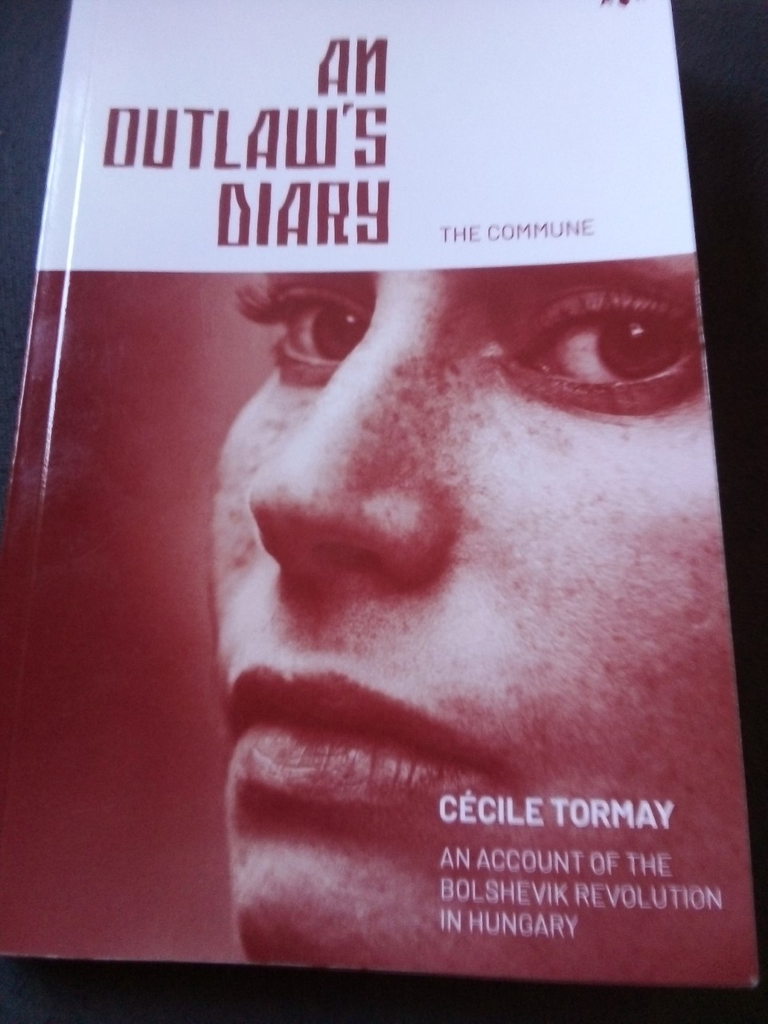
Good day Hivers and Book Clubbers,
I'm back with another book review, and unlike the last book, I hope to manage this one in a single article of reasonable length. When looking for/buying books I'm always interested in stories that are 'rescued', i.e. almost-forgotten books and histories on the lesser known subjects. The book I'm reviewing today can be seen as fulfilling that description.
Its full title is 'An outlaw's diary; an account of the Bolshevik revolution in Hungary', written by Cecile Tormay, a Hungarian writer and antirevolutionary. Originally published in English in 1923, it has seen the limelight again thanks to Antelope Hill Publishing, who re-released this title in 2020. I bought if off of Amazon, so it's probably widely available in many places of the world.
As the title implies, the book is structured as a diary. Over a period of about five months, from march 1919 to august 1919, there are entries for almost every day. Some are filled with current events, others are to give perspective of the entire situation in Hungary, whether about the current government or geopolitics. I won't make this a play-by-play for the entire story; in this review I'll talk more about the background and circumstances of the story proper, which means I can talk more about history.
Communist Revolution
The history of Hungary, as that of most countries on this earth, is complicated. But for the past several centuries, it knew a foreign ruler; the Habsburg Dynasty. The Habsburg monarchy ruled over quite a vast territory at the turn of the 20th century; it included modern-day Austria, Slovenia, Czechia, Slovakia, Croatia, Bosnia, Hungary, and parts of Poland, Romania and Serbia. A massive, multi-ethnic and multi-religious block.
The Hungarians could be considered the most prominent entity within this realm, after the Austrians. They still held a lot of local autonomy, and some of the other peoples in the realm swore fealty to them instead of to Vienna (most notably the Croats).
The Habsburgs would end up at war with the Entente in World War One, which was triggered by the murder of the Habsburg arch-duke, Franz Ferdinand, in Sarajevo. The war proved that the Habsburg realm was fragile, and did not do very well in battle. In the end, the war was lost, and the Habsburgs dynasty came to an end as far as ruling parts of Europe was concerned.
One of the main results of World War One was socialism breaking to the surface. It had built up in the decades before as a political current, but exploded onto the world in Russia, during both the february and october revolutions in Russia. One aspect of communism is its global goal; it looks to unite the whole world in this one globalistic ideology, as a one-size-fits-all solution to the issues of the world.
There was a similar two-step process in Hungary as there was in Russia. The book tells of the socialist-aligned revolution in october of 1918, and of a direct communist takeover, led by Bela Kun, in march of 1919, about half a month later. The similarity with Russia is remarkable in this regard.
Tormay was at 'ground zero' for the communist revolution in Hungary, which was the capital, Budapest. Throughout the story, one can really get a feel for how there was no real support for communism outside of Budapest and other larger cities; from here, the revolutionaries struggled to get their bearings on the country.
It also shows how the resistance to communism was almost non-existent then, since the regime itself was for all appearances and talk of 'revolution', pretty weak all around. But the powers of the country were spent in the World War, so resistance was sporadic.
Also, the sheer brutality of the communist regime was remarkable. Death sentences without a fair hearing were passed and executed on the spot. All forms of 'anti-revolutionaries' from all political and religious proclivities were persecuted, all considered enemies of the revolution. Tormay, the writer, was considered an anti-revolutionary as well, and had to flee Budapest until the regime was overthrown.
Conclusion
The book reads somewhat like a thriller, since the writer is fearful for her life, for good reason. In the end, Bela Kun's regime lasted for four months. Hungary was at war with its neighbours, looking to spread the revolution. It was, however, far weaker than Romania, which entered Budapest in early August of 1919. The communist leadership fled to Vienna, not to return.
The irony is that communism would later come back to Hungary, once again from Moscow, but now through Stalin instead of Lenin and Trotsky. Today, one could consider Hungary to be one of the most militant anti-communist countries in the world. Perhaps this is because its people have lived through two communist administrations, one only lasting a few months, and the other lasting several decades.
The book is a good blend of storytelling, historical background and geopolitics, and I can recommend it. It totals about 200 pages, and reads away pretty well, although I wouldn't consider it light reading in the way a work of fiction can be. Some of the details are pretty gruesome as well. I'll be back with more book-reviews in the future. I'll see you all in the next one,
-Pieter Nijmeijer
(Top image; selfmade photo of book cover)
Your content has been voted as a part of Encouragement program. Keep up the good work!
Use Ecency daily to boost your growth on platform!
Support Ecency
Vote for new Proposal
Delegate HP and earn more
This is such a new realm personally for me. I would have enjoyed reading something like this, not to mention, I didn't know Hungary was under communism. Thanks for staying consistent in sharing nonfiction book in our community. We need more people like you around 😃
Is an intersting history, and a good review, thanks for sharing